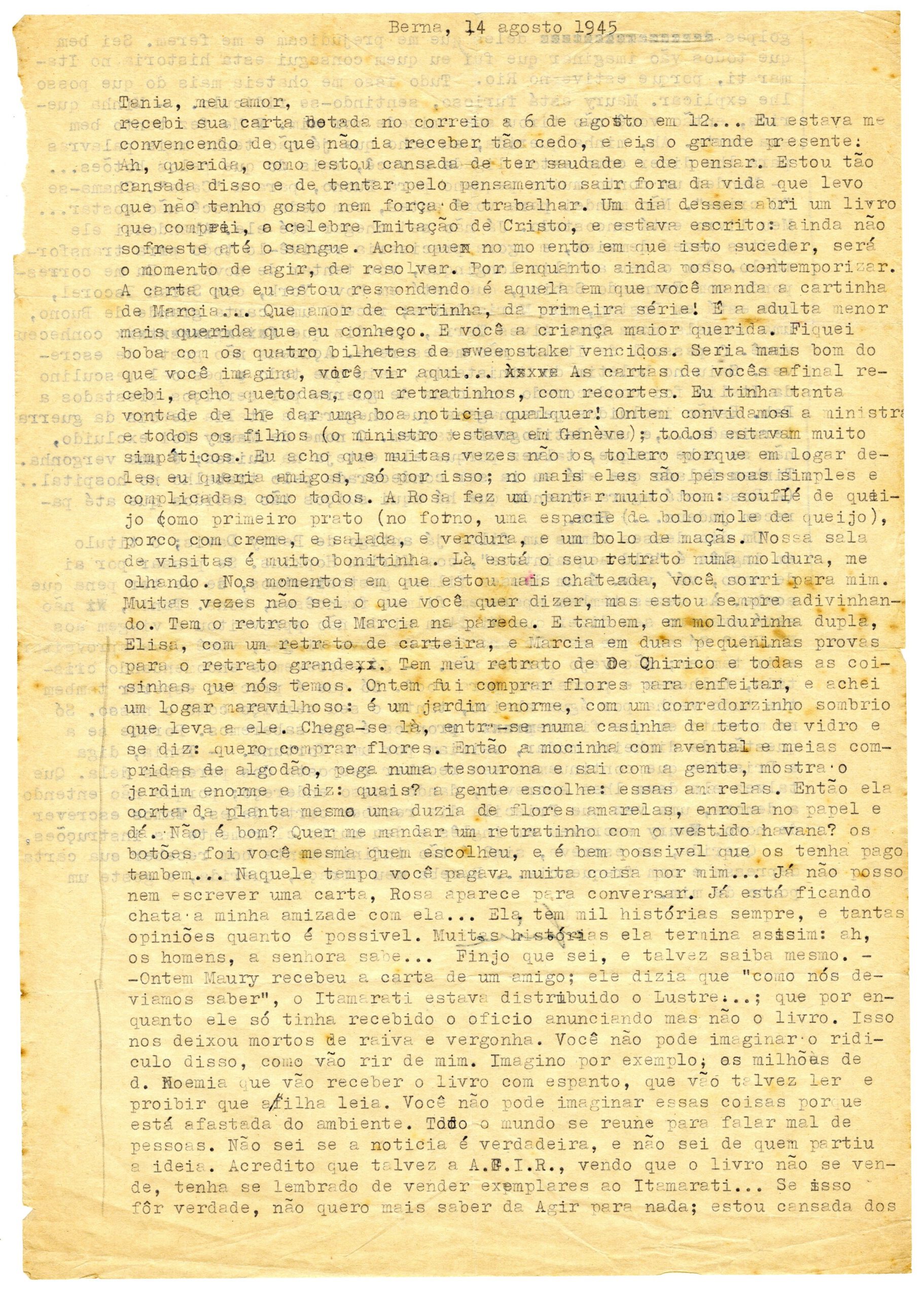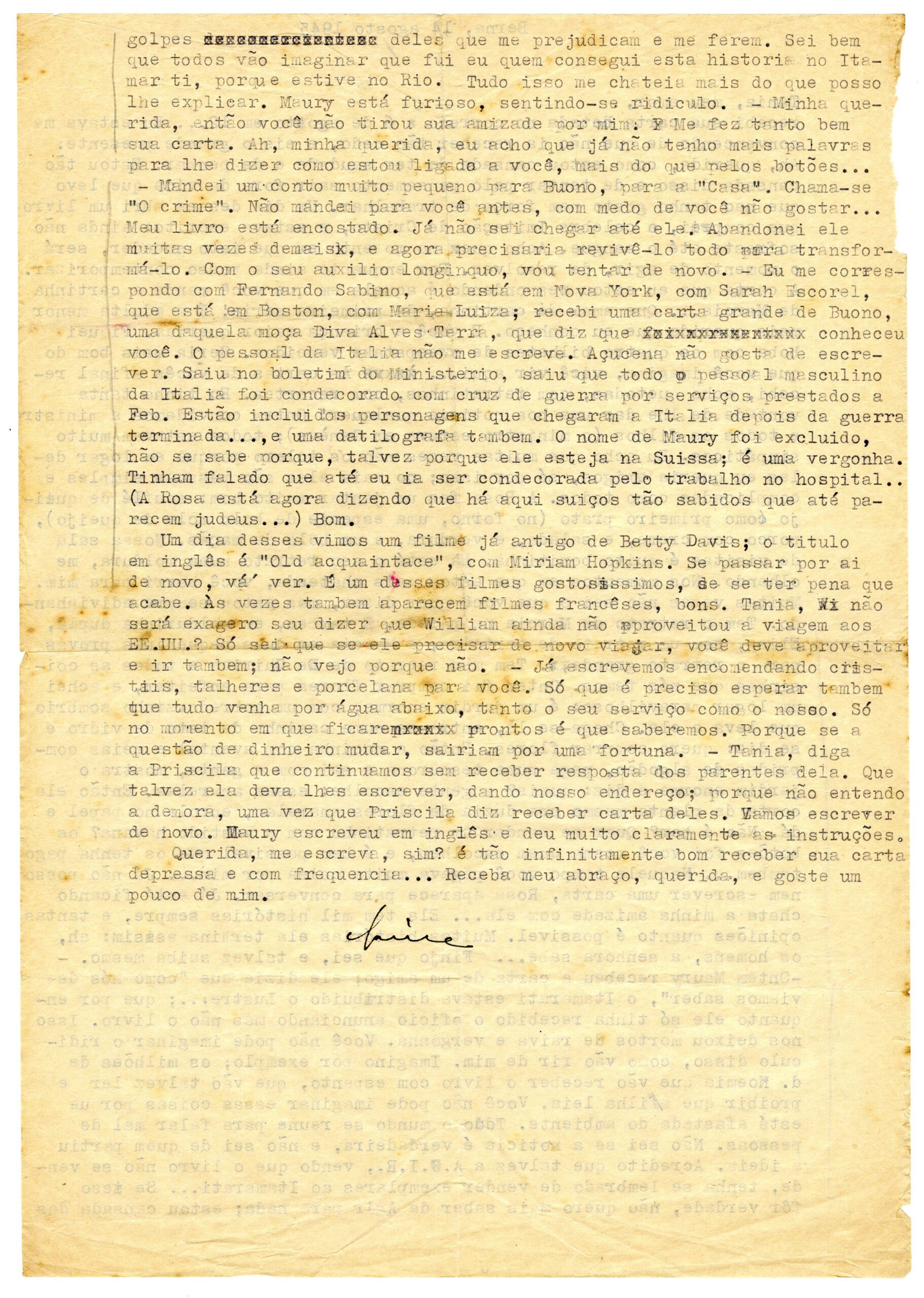Bern, August 14, 1946
Tania, my love,
I received your letter postmarked August 6th on the 12th… I was convincing myself that I wouldn’t receive it so soon, and then comes the big present: Oh, darling, how I’m tired of missing everyone and of thinking. I’m so tired of it and trying through thought to escape the life I live that I have no desire or strength to work. The other day I opened a book I bought, the celebrated The Imitation of Christ (Published in the 15th century, by an unknown author. There are those who attribute its authorship to the German priest Thomas à Kempis. Considered the most read work in the Christian world after the Bible. Clarice made a few comments about reading this work with Fernando Sabino (Cartas perto do coração [Letters Near to the Heart]). “I’ve been reading a lot the Imitation of Christ which has been purifying me at times.” (p. 21)) “As for the Imitation of Christ, it tells us to suffer until we bleed, and completely surrender. To suffer until we bleed, I’ll get there and actually sometimes I’ve already gotten there. But to abandon myself, I don’t know how, I lack grace. As Álvaro Lins says, I’m often called and never chosen…” (p. 45)), and it was written: you have not suffered yet until you bleed. I think that when this happens, it’ll be time to act, to decide. Meanwhile I can still contemporize. The letter I’m answering is the one in which you send Marcia’s note… What a sweet note, first rate! She’s the most adorable smaller adult that I know. And you’re the most adorable bigger child. I was shocked by the four expired sweepstake tickets. It would be better than you imagine, you coming here… I finally received your letters, I think all of them, with pictures, clippings. I really wanted to give you some good news. Our living room is very nice. Your portrait is there, looking at me. Whenever I’m most upset, you smile at me. I often don’t know what you want to say, but I’m always guessing. Marcia’s portrait is on the wall. And also, in a double frame, Elisa, with a wallet-sized picture, and Marcia in two small proofs for the large portrait. There’s my portrait by De Chirico (Giorgio de Chirico, [1888-1978]. He is part of the Metaphysical Painting movement, which anticipated elements that later appeared in Surrealist painting. In the beginning of the 1920s, his work obtained considerable success in vanguard circles, and in 1925, he participated in the first Surrealist exhibition. Among his most well-known works are Portrait of Guillaume Apollinaire, Hector and Andromache, and the Disquieting Muses.) and all the little things we have. Yesterday I went to buy flowers for decoration, and I found a wonderful place: it’s a huge garden, with a little dark hallway that leads to it. You get there, enter a little house with a glass roof and say: I want to buy flowers. Then the girl with an apron and long cotton socks grabs some shears and takes us outside to the huge garden and says: which ones? We choose: those yellow ones. So she cuts a dozen yellow flowers right from the plant, wraps them in paper, and gives them to us. Isn’t that nice? Do you want to send me a picture with the Havana dress? You chose the buttons yourself, and it’s very likely that you paid for them also… In those days you used to pay for a lot of things for me… Now I can’t write a single letter without Rosa showing up to talk. My friendship with her is already becoming a bore… She’s always got a story to tell, and as many opinions as possible. She ends many stories like this: oh, men, you know… I pretend I know, and maybe I really do. – Yesterday Maury received a letter from a friend; he said that “as we must know,” the Ministry of Foreign Affairs was distributing the Chandelier…; that meanwhile he had only received the notice announcing it but not the book. This left us morbidly angry and ashamed. You can’t imagine how ridiculous this is, how they’ll laugh at me. You can’t imagine these things because you’re far from the environment. Everybody gathers to talk bad about people. I don’t know if the news is true, and I don’t know whose idea it was. I believe that the publisher Agir, seeing that the book is not selling, remembered to sell copies to the Ministry of Foreign Affairs… If that’s true, I don’t want anything to do with Agir, I’m tired of their coups that harm and hurt me. I know well that everyone will imagine that I was the one who arranged this with the Ministry of Foreign Affairs, because I was in Rio. This all upsets me more than I can explain. Maury is furious, feeling ridiculous. – My dear, so you’re still friends with me. Your letter made me feel so good. Oh, my dear, I think I no longer have the words to tell you how I’m connected to you, not just because of the buttons…
– I sent a very short story to Buono, to the “House.” It’s called “The Crime” (Later published under the title “The Crime of the Math Teacher” in Family Ties [Francisco Alves, 1960].). I didn’t send it to you earlier, fearing you wouldn’t like it… My book is on hold. I no longer know how to approach it. I abandoned it too many times, and now I need to relive all of it to transform it. With your remote assistance, I’ll try again. – I’m corresponding with Fernando Sabino, who’s in New York, with Sarah Escorel (Wife of the diplomat Lauro Escorel. The couple were often with Clarice and Maury in Washington.), who’s in Boston, with Maria Luiza; I received a long letter from Buono, one from that girl Diva Alves Terra, who says she met you. The people from Italy don’t write me. Açucena doesn’t like to write. It was published in the Ministry’s newsletter, it was published that all men in Italy were awarded a war cross for services offered to the Brazilian Expeditionary Force (FEB), including people who arrived in Italy after the war was over…, and a female typist, also. Maury’s name was excluded who knows why, maybe because he’s in Switzerland; it’s a shame. They had said that even I’d be awarded one for the work at the hospital… (Rosa is now saying that there are Swiss people here so wise that they even seem Jewish…) Alright.
The other day we saw an already old film with Bette Davis; the English title is “Old Acquaintance,” with Miriam Hopkins (Old Acquaintance (1943), starring Miriam Hopkins and Vincent Sherman.). If it returns to theaters, go see it. It’s one of those really nice films, that you wish never ended. Sometimes good French films also appear. Tania, wouldn’t it be an exaggeration for you to say that William did not enjoy the trip to the U.S.? I only know that if he needs to travel again, you should make the most of it and go also; I don’t see why not. – We’ve already written to order glassware, silverware, and chinaware for you. But it’s also necessary to expect for everything not to work out, both your service and ours. Only when they’re ready we’ll know. Because if the issue of money changes, they’d cost a fortune – Tania, tell Priscila that we still haven’t received an answer from her relatives. That maybe she should write to them, giving our address, because I don’t understand the delay, since Priscila says she receives their letters. Let’s write again. Maury wrote in English and gave very clear instructions.
Darling, write me, OK? It’s so infinitely good to receive your letter quickly and frequently. Hugs, darling, and be a little fond of me.
Clarice


